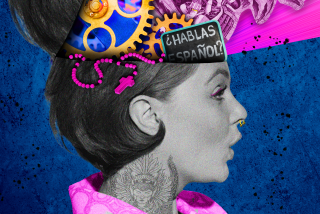Thinking globally, acting locally
- Share via
HOW quixotic is Kwame Anthony Appiah, the mostly optimistic philosopher of cosmopolitanism? Appiah’s new book, “Cosmopolitanism: Ethics in a World of Strangers,” builds on themes that he developed two years ago in “The Ethics of Identity” and urges a pragmatic sociability on people who ordinarily manage encounters with their neighbors through guarded gates, blocked phone numbers and tinted car windows. But does Appiah’s literate defense of getting to know the people next door -- and the people halfway around the world -- really have much of a chance against the fierce egoism of the self-obsessed and the fiercer loyalty of the tribal?
I’d like to think that something does, since the alternatives have dwindled to values-free globalization, spineless multiculturalism and jihad. Still, how seriously should we take Appiah’s conviction that a world misshapen by the presence of suicide bombers can be reformed by conviviality?
Very seriously, he insists. For Appiah, the cosmopolitan habit of give-and-take across political, religious, gender and racial boundaries leads to nothing less than the making of a moral imagination. That imagination flinches when blows are laid on another’s back, resonates with the prayers of another’s worship and savors another’s wisdom even when that person’s experience is wholly foreign. The result isn’t bland tolerance -- a polite refusal to get upset by habits not your own -- but something far harder to get at. It’s the capacity for fellow-feeling and everything that properly flows from it.
“I am urging,” Appiah writes, “that we should learn about people in other places, take an interest in their civilizations, their arguments, their errors, their achievements, not because that will bring us to agreement, but because it will help us get used to one another. If that is the aim, then the fact that we have ... opportunities for disagreement about values need not put us off. Understanding one another may be hard; it can certainly be interesting. But it doesn’t require that we come to agreement.”
The moral imagination may range freely and sympathetically in the strangeness of other values, but it remains rooted. “Cosmopolitans think that there are many values worth living by and that you cannot live by all of them,” Appiah writes. “So we hope and expect that different people and different societies will embody different values. (But they have to be values worth living by.)”
Although “Cosmopolitanism” is a brief book and aimed at nonspecialists, it lingers over a philosophical argument about the universality of those values. It is important to Appiah to establish clearly that such values as kindness, forbearance and generosity have a legitimacy beyond the relativist’s belief that your values and mine are purely local responses to historical and environmental conditions. (And if we agree that “each to his own taste” represents a universal principle, haven’t we already agreed that one value, at least, isn’t relative?)
The heroism of self-definition that runs from Voltaire to Sartre (or as emblematically from John Milton to Buffy the Vampire Slayer) is impressive but fatally limiting, Appiah warns, if the making of an unencumbered self is the only script we can follow. Individuals share the world, after all, where their value-laden words and value-driven actions jostle unendingly against those of others, necessitating conversations about what rubs each of them the wrong way and why (with implications that their complaints can be resolved).
Conversation is a modest habit on which to build a global ethics, but it’s paramount in Appiah’s blended British and Ghanaian experience, where cross-cultural talk mulls over traditional proverbs, the exploits of family heroes (both African and European) and the complexities of living within competing systems of obligation. (Fathers matter more in England; a mother’s brothers are more important in the matrilineal system of Appiah’s Asante heritage.)
The essence of Appiah’s cosmopolitanism is found in this kind of conversation, which might be described as everything that a debate, manifesto or Fox News program isn’t. Appiah’s idea of conversation engages history, the latest Beyonce album, Shakespeare, faith and the proper response to Third World poverty. All of these topics are subject to open-ended discourse, with no requirement that you and I ever settle on anything except the pleasure (and needfulness) of talking together about them.
This worldview may well seem almost too good-natured, at a time when bullying and seduction are the accustomed modes of public conversation and the notion of an irreconcilable “clash of civilizations” is offered as a substitute for the ideal of a shared humanity. Appiah sums up his hope with the slogan “Cosmopolitanism is
Still, Appiah reminds us, moral imaginations working in this world are dramatically changing the ways in which we treat each other. The toxic effects of modernity may kill us all one day, but at least the modern moral imagination has extinguished the idea of slavery. It’s already well along toward extinguishing the idea of women’s subservience. Can (or should) there be a continuum that extends from the abolition of slavery to, for example, the ending of gender distinctions in marriage? Or the provision of a decent standard of living for the poor of Africa, South Asia and South America?
“The real challenge to cosmopolitanism isn’t the belief that other people don’t matter at all,” Appiah points out, “it’s the belief that they don’t matter very much.” A cosmopolitan finds obligations arising from engagement with people otherwise easy to ignore because they live in Darfur or East L.A. Cosmopolitans are touched to respond in ways that can change law and public policy. Appiah thinks they ought to be advocates of a transnational system of social justice, for example, and be skeptical of identity politics.
These are large concerns. But Appiah has a more intimate message for his readers: Your moral imaginings and the impulses you’ve allowed to flow from them are not as contrived or simple-minded as you had feared. Your modest provincialism, properly understood as cosmopolitan, can contain worlds. *
*
From Cosmopolitanism
CROSS-cultural analysis reveals that there really are some basic mental traits that are universal -- in the sense that they’re normal everywhere.... It is hard ... to resist the evidence that, starting with our common biology and the shared problems of the human situation (and granted that we may also share cultural traits because of our common origins), human societies have ended up having many deep things in common. Among them are practices like music, poetry, dance, marriage, funerals; values resembling courtesy, hospitality, sexual modesty, generosity, reciprocity, the resolution of social conflict; concepts such as good and evil, right and wrong, parent and child, past, present, and future. “If a lion could speak,” Ludwig Wittgenstein wrote, “we couldn’t understand him.” It’s a shared human nature, he meant, that allows us to make sense of one another.
More to Read
Sign up for our Book Club newsletter
Get the latest news, events and more from the Los Angeles Times Book Club, and help us get L.A. reading and talking.
You may occasionally receive promotional content from the Los Angeles Times.










